Thailand 'to receive' those fleeing Myanmar violence

Thailand is preparing to receive people fleeing fighting in Myanmar and send them back "when they are ready", the prime minister said today, following a series of attacks by Rohingya Muslim insurgents on Myanmar security forces last week.
Thailand was once a popular transit route for Rohingya escaping troubled Rakhine state in northwest Myanmar across the Andaman Sea. Others came by land.
But a 2015 Thai police crackdown on human trafficking syndicates led to ships with migrants aboard being abandoned at sea. It also disrupted the networks that brought migrants from Myanmar and Bangladesh to Thailand and Malaysia.
"Thailand's defence ministry and security are preparing to receive various displaced people," Prime Minister Prayuth Chan-ocha told reporters.
"We will provide them with shelter like in the past ... and send them back when they are ready."
Prayuth did not say whether any displaced people had arrived in Thailand. He did not specifically mention the Rohingya.
Thai immigration police told Reuters in May that people-smuggling across the border from Myanmar to Thailand was rising despite the crackdown.
At least 109 people were killed in the recent violence in Rakhine, most of them militants, but also members of the security forces and civilians.
A previous round of insurgent attacks in October prompted a ferocious military response that displaced 87,000 Rohingya and was dogged by allegations of atrocities.
Many observers fear a repeat of 2012, when clashes between the Rakhine Buddhist majority and Rohingya minority killed nearly 200 people and displaced 140,000 - most of them Rohingya.
The treatment of about 1.1 million Rohingya in Myanmar has become the biggest challenge for national leader Aung San Suu Kyi, who has been accused by Western critics of not speaking out on behalf of the long-persecuted minority.
Thailand does not recognize the status of refugees and it does not recognize the Rohingya as legitimate migrant workers.
Phil Robertson, deputy director of Human Rights Watch's Asia Division, said Thailand should re-evaluate its policy towards fleeing Rohingya.
"If the prime minister is serious, he should instruct that there be a long overdue re-evaluation of Thai policy towards fleeing Rohingya that recognizes these people are not seeking to resettle in Thailand, but rather just trying to land somewhere safe where they can reside temporarily in dignity before continuing their journey," Robertson told Reuters.
Rohingya fleeing to Bangladesh from escalating fighting in Myanmar face the growing danger of sickness and attempts by the Bangladesh authorities to send them home despite a U.N. plea that they be allowed to stay.

 For all latest news, follow The Daily Star's Google News channel.
For all latest news, follow The Daily Star's Google News channel. 








Comments